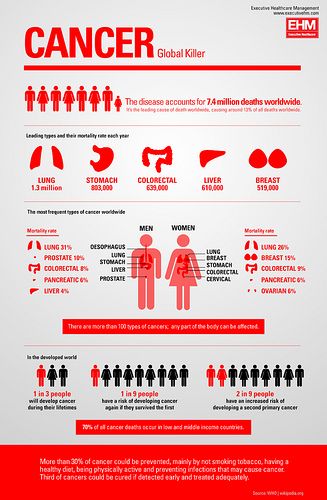
Cancer Research and Resources
Cancer doesn't just affect the people who have it; it also has huge impacts on the individuals around those who are battling the disease. That's why it's extremely important for everyone to learn as much as they can about cancer.
This article will discuss basic information about the disease. Read on to learn more about the types of cancer as well as their prevention and treatment.
Cancer Defined
The American Cancer Society defines cancer as "the general name for a group of more than 100 diseases." And even though "there are many kinds of cancer, all cancers start because abnormal cells grow out of control." If left untreated, cancer can lead to sickness and death.
To understand how cancer works, you need to first understand how the body's cells work. The human body is made up of numerous living cells. These cells go through a lifecycle in which they grow, divide, and die. According to the American Cancer Society, for those at a young age, "normal cells divide faster to allow the person to grow. After the person becomes an adult, most cells divide only to replace worn-out or dying cells or to repair injuries."
Cancer occurs when there is abnormal cell growth in the body. Instead of dying, cells keep growing and form even more abnormal cells (or cancer cells) in the process. These cancer cells grow even further that they invade other tissues and organs, thus growing out of control and causing harm to the human body.
Cancer Causes
Cancer can be caused by several different factors, including your genes, your lifestyle, and your environment.
Genetics. There certain types of cancers that run in the family. Such types include breast cancer and colon cancer. This is why it's extremely important to get regular tests for the disease when you have a number of family members who have gotten particular types of cancer.
Lifestyle and Environment. Your lifestyle, diet, and physical activities and can also affect your chances of getting cancer. Smoking for instance, increases your chances for lung cancer. Similarly, excessive alcohol intake can also increase your risks, and being overweight or obese can do so as well. Too much exposure to the sun has also been linked to skin cancer.
It is recommended that you examine your lifestyle and avoid doing things that are linked to cancer. Staying away from tobacco, drinking moderately, and wearing sun block are examples of such lifestyle changes that can lower your risk of getting the disease.
Cancer Treatments
Treatments for cancer will depend on a number of factors, including the cancer type and how advanced it is. Examples of cancer treatments include:
Chemotherapy.This method of treatment makes use of chemical substances to kill cancer cells and is usually used on patients which cancer that has already metastasized.
Radiation Therapy.This treatment kills cancer cells and shrinks tumors by damaging their DNA through radioactive substances.
Cyrosurgery. This particular treatment exposes select tissues to extreme cold (usually liquid nitrogen) to kill the abnormal tissues.
There are several other cancer treatments, including transplantation, gene therapy, lasers, etc. You can learn more about these treatments by checking out the resources below:
National Cancer Institute - The government's main agency for cancer research and training.
Cancer.org - Website of the American Cancer Society.
Children's Cause Cancer Advocacy - This organization works to conquer childhood cancer.
City of Hope - One of the leading comprehensive cancer centers designated by the National Cancer Institute.
SHARE - A website about Self-help for Women with Breast or Ovarian Cancer.
The Beverly Fund - An organization focused on lung cancer.
YSC - Website of the Young Survival Coalition (Young women facing breast cancer together).
Breast Cancer Action - An organization focused on breast cancer.
Chordoma Foundation - A nonprofit organization working to improve the lives of chordoma (bone cancer) patients.
AICR - Website of the American Institute for Cancer Resesarch
ACOR - Association of Cancer Online Resources
OncoLink - Abramson Cancer Center of the University of Pennsylvania
Image credit: GDS Infographics on Flickr
Categories
- Arts & Entertainment 100
- Automotive 186
- Business & Professional Services 219
- Construction & Contractors 298
- Clothing & Accessories 76
- Community & Government 95
- Computers & Electronics 74
- Education 75
- Food & Dining 86
- Health & Medicine 186
- Legal & Financial 100
- Home & Garden 179
- Industry & Agriculture 105
- Media & Communications 44
- Personal Care & Services 73
- Real Estate 68
- Shopping 74
- Sports & Recreation 87
- Travel & Transportation 102
- Animals & Pets 11
- Arts 9
- Community 9
- Chain 607
- Computers & Internet 8
- Health Care 10
- Communication & Media 7
- Shopping & Retail 10
- Health & Beauty 9
- Education & Schools 8
- Financial & Legal Services 14
- Home & Office 13
- Lawyers & Legal Services 7
- Financial & Services 1
